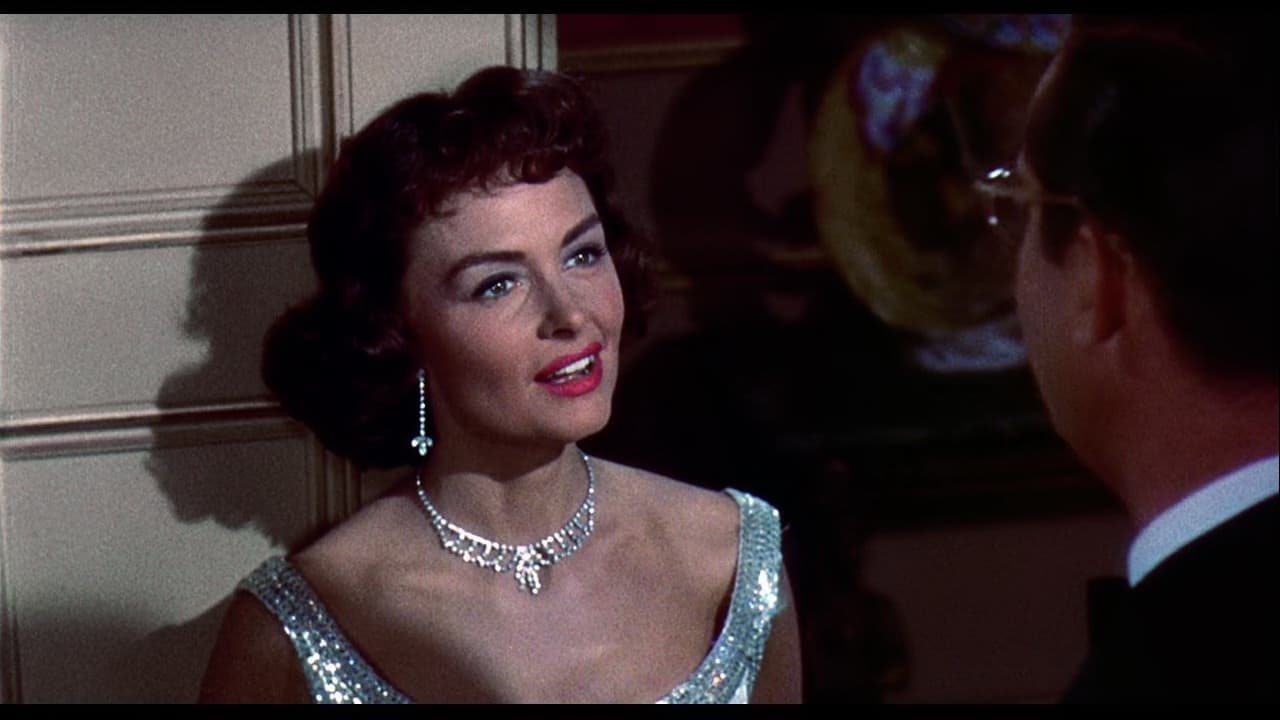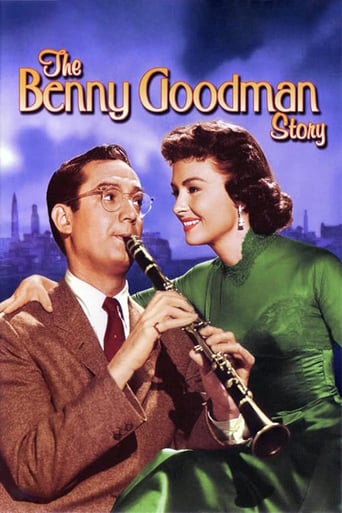

That was an excellent one.
... View MoreDid you people see the same film I saw?
... View Moren my opinion it was a great movie with some interesting elements, even though having some plot holes and the ending probably was just too messy and crammed together, but still fun to watch and not your casual movie that is similar to all other ones.
... View MoreThere is definitely an excellent idea hidden in the background of the film. Unfortunately, it's difficult to find it.
... View MoreHaving cleaned up with The Glenn Miller Story (a bio-pic of a trombone playing band leader) the previous year, Universal decided to cash in on what they hoped might develop into a trend with a second musical bio-pic but this time centred around a clarinet playing band leader. Accordingly they tapped the writer of the Glenn Miller Story, Valentine Davies to write the follow-up and even allowed him to direct what turned out to be his only movie. Alas, he opted for the wrong clarinet playing leader and gave us Benny Goodman instead of the far superior Artie Shaw, thus losing out on non-musical color (Shaw was a serial husband, urbane, and a polished writer whilst Goodman was a bad nowhere to a blancmange without a clarinet in his hand). Even as a musician Goodman lagged far behind Shaw, so what we are left with is one or two well-known tunes - One O'Clock Jump, Stompin' At The Savoy, Avalon, Don't Be That Way - and appearances by musicians long past their sell-by date such as Kid Ory, Harry James, Gene Krupa, Teddy Wilson, Lionel Hampton and the ubiquitous Ben Pollack who'd probably been sleeping in a dark corner of the Sound Stage since The Glenn Miller Story was wrapped a few months earlier. On the other hand it could and did get worse, Drum Crazy (The Gene Krupa Story) anyone? See if for the music.
... View MoreThe opening sequence with Papa and Mama Goodman and their kids shows us a slice of cozy urban ethnic life, but in fact Benny Goodman grew up in terrible circumstances, the ninth of 12 children in a poor family in a rotten neighborhood of Chicago. He was haunted all his life by the hard labor endured by his father in order to feed the family.And so it goes throughout this movie: the reality has been bled out of the story so that what's left is lifeless. In the film, black musicians like Teddy Wilson and Lionel Hampton just happen to join up with Goodman, when in fact it was almost unprecedented to have blacks and whites performing together, at least before white audiences, and certainly in the South, where the bands would tour. After Goodman set the precedent of working with blacks, black members of white bands still regularly endured all sorts of humiliations in the South, and not just there.It has been said that the soggy plot and Steve Allen's deadly performance can be overlooked because there is so much great music throughout the film. There is something to be said for that. But consider what was done in the final sequence--the 1938 Carnegie Hall concert. Yes, it was fun seeing the real Harry James, Ziggy Elman, and Gene Krupa perform. But we had to endure repeated cutaways to Goodman's mother and girlfriend, and the real focus of the sequence was on this sappy, conventional romantic situation rather than on the importance of the concert.I had just listened to a recording of the entire concert--introductions, setups, and applause included--prior to watching this movie. It was the Goodman orchestra at the peak of its powers, and the evening must have been electrifying. It certainly was a milestone in jazz history. Also present were other greats of jazz from the Ellington and Basie bands (even Basie himself at one point). Watching the chopped up portrayal of the concert in the film, I wished Donna Reed and the actress playing Mama Goodman would just disappear.And yet clearly Benny Goodman gave his stamp of approval for the film, providing all the clarinet music. I doubt that he needed the money. So go figure.
... View MoreHe was born in the spring of 1909, and beginning with his first hit recording, "Moon Glow" in 1934, he routinely scored a dozen top-ten hits on a yearly basis. Some regard his title, "The King of Swing," as insulting to the African-American tradition that became America's indigenous art form, jazz. It's true that Count Basie, Duke Ellington, Chick Webb, and Fletcher Henderson probably deserved the title, but Benny Goodman was also deserving, and moreover an admirable, seminal representative of the historical period that became known as the "Swing Era." Moreover, in his 1938 Carnegie Hall concert he broke both the "cultural" barrier that insisted on privileging classical European music over "vulgar" American popular forms as well as the color barrier that made it unusual, unlikely, and often impossible for white and black musicians to play on the same stage. Benny was a great musician, as in command of a classical repertory as of jazz, but he was also an ambassador and an example, making the public aware of the music of Billie Holiday (he also introduced Peggy Lee), Lester Young, Lionel Hampton, Teddy Wilson, and the beauties of a music that was a sophisticated American music as well as a highly swinging one.Forget the plot of this adequate but conventional love story. You'll have to look long and hard to find a movie with this much great American music. And give some thought to the revolution that began in the 1950s and changed the American landscape in the 1960s after the "British invasion." Goodman looked like a boring banker. He wore suits and ties--and he played clarinet! How could he have been adopted by a primarily young generation as a hero if not major pop star? Steve Allen is a bit better looking (and far more clever and articulate) than Goodman, but he won't explain the revolution that made hair, guitars and grubby jeans more worthy of our time, attention, and money, tons of it, than a genteel adult like Goodman. Benny instead introduced us to a guitarist who was black, wore suits, and became known as the "Father of the Jazz guitar," Charlie Christian. Benny Goodman was about sophistication, civility, and competence--and that's exactly what you get, and in abundance, from the musically hip Steve Allen.Thanks to this movie, I developed a lifelong love of jazz. I'm still swinging, and I'm still left puzzled by the sounds of distorted guitars, of groups that can't perform without vocals, and of drummers who are clueless about the subtle, airborne groove of a 4/4 walking bass, a tight hi-hat, and a shimmering ride cymbal. And I still fail to grasp the entertainment value of performers who wear torn jeans, earrings and tattoos while commanding tens of thousands for a single performance. If you can't hear music unless the beat sounds like an amplified, mechanical drill hammer, you probably won't like this movie.
... View MoreTHE BENNY GOODMAN story, the half brother of the GLENN MILLER STORY and the GENE KRUPA STORY and the first cousin of THE FABULOUS DORSEY'S is a made to order biopic that lacks ooomph because of the reticence of the title character. Steve Allen's Goodman doesn't have the boyish enthusiasm that James Stewart had as Miller, but rather a quiet nerdishness that although possibly respresenting the person correctly, doesn't make for thrilling cinema. Because of this, Allen treads water valiantly, while all Donna Reed has to do is look lovingly at him and look as beautiful as, well, Donna Reed. (The real find in the film is Berta Gerstein, of whom I had never heard, but who I gather from reading the IMBD database, must have been a Yiddish theater/cinema star, as Benny Goodman's mother. She is so real that she makes the rest of the actors seem like cardboard.) But what a treat it is to see and hear Kid Ory, Harry James, Martha Tilton, Lionel Hampton, Ziggy Elman, Urbie Green and to hear Goodman himself.Where the film shines is in its music and never more so than at the halfway point's Paramount Theater engagement and the ending's Carnegie Hall concert of 1938. In these two spots the film soars. AND THE ANGEL'S SING is classic and SING SING SING will blow the top off your DVD player.So, THE BENNY GOODMAN STORY, usual biopic with some amazing music. (Want a great double feature? No, not THE GLENN MILLER STORY which is fun, but rather the 1947 NEW ORLEANS with more jazz greats including Louis Armstrong. Now, as Cole Porter would say, you has jazz!)!!!!!!!!
... View More